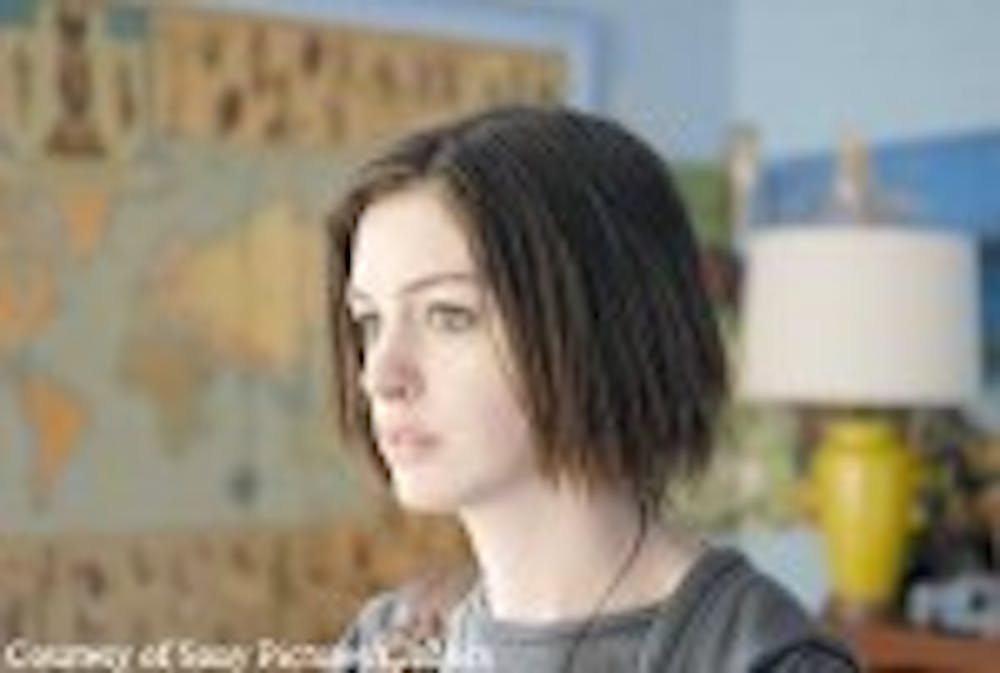Unconditional love may be one of the most conditioned things in life. Director Jonathan Demme's new film, Rachel Getting Married, examines this strange dynamic and the family that comes with it.
On the weekend of her sister's wedding, Kym (Anne Hathaway, Get Smart) is released from rehab but is clearly not fully recovered. What ensues is a brutal, documentary-styled observation of Kym and her family's attempts to love and accept her back into their home.
Hathaway, a cigarette in her mouth for the better part of the film, melts into her role. At first a hard-edged, near-stereotypical portrayal of a recuperating addict, the young actress finds her note and plays it throughout, becoming Kym and all of her demons.
Since her breakout role in 2001's The Princess Diaries, Hathaway has offered consistently solid performances. Unfortunately, her female counterparts have consistently overshadowed her, whether they be Meryl Streep in The Devil Wears Prada or Michelle Williams in Brokeback Mountain. With this role as the anti-heroine, Hathaway has finally blossomed into the A-list performer she was born to be.
Both Demme (The Manchurian Candidate) and director of photography Declan Quinn (Pride and Glory) do not keep the camera on Hathaway throughout, however, and it does the film a world of good.
The supporting characters and soundtrack, both on-screen and off, are fleshed out, creating a world brought together by a wedding that forces the combination of two families, observing the love, hate and memories that continuously conflict.
Written by Jenny Lumet, daughter of legendary director Sidney Lumet (Before the Devil Knows You're Dead), the screenplay reads more like some debunked Tennessee Williams' play than a film narrative. The structure of the film is rather flimsy, the traditional Hollywood three-act structure fusing into one act of dysfunctional family dynamics.
Character actor Bill Irwin (Across the Universe) eats up his screen time as Kym's protective father Paul. Irwin employs a tragic smile and nervously optimistic demeanor to his character, these tools coming to the surface during a confrontational scene involving a family tragedy years past.
Along with Irwin is Rosemarie Dewitt (Margaret) as the title character. At film's beginning, she is painted as both "the beautiful bride" and "the golden child." Thankfully, Lumet offers characterization that tears down these shallow assumptions, forcing viewers to consider the sister's relationships from both sides.
From a visual perspective, the realistic, digital approach works here, to an extent. Quinn does overdo it at points, overusing the zoom lens during the rehearsal dinner scene and wedding reception. By zooming in and out in the middle of the scene, Quinn reminds viewers that they are watching a movie, preventing them from becoming part of the film.
That being said, where Quinn fails with zoom he succeeds with focus. The lens blurs and distorts and focuses without warning, establishing a seemingly chaotic but interwoven rhythm that spellbinds the viewer ever so slightly.
In many ways, this is Demme's return to form. A once-great director with a recent slew of near misses and way-offs (The Truth About Charlie was rough), the veteran director has gone back to basics, choosing to focus more on characters rather than style.
In the end, the film belongs to Hathaway. By the complex and confused, yet celebratory, finale Hathaway has become Kym and viewers will have trouble recognizing an actress who has spent the better part of her career being transformed into a princess.
While Oscar will most definitely ignore Demme for directing a small masterwork like this, Lumet and Hathaway will most certainly be dawning nomination-worthy dresses on the red carpet.





